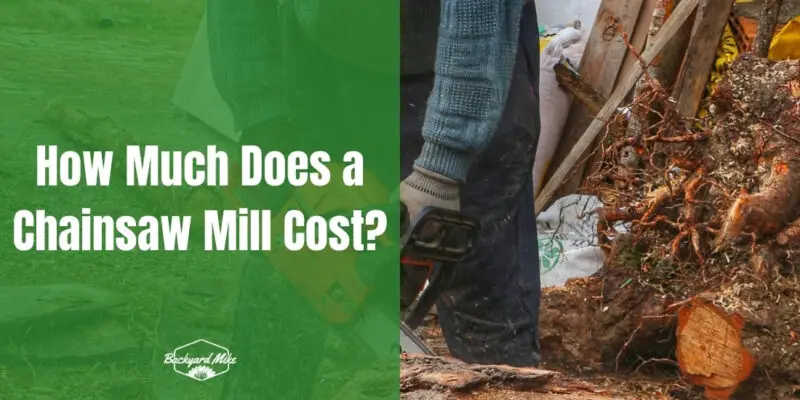For a chainsaw mill, expect to spend between $300 and $6,999, depending on the model and capacity you choose. Entry-level models start at $300, offering affordability for beginners. Mid-range options, like the Alaskan MKIV, go up to $575, providing a balance of cost and features. High-end professional mills reach $6,999, reflecting quality and durability for heavy-duty tasks. Factor in additional costs for accessories and setup, which may increase your total expense. More factors await your discovery.
Key Takeaways
- Basic chainsaw mills start around $300, such as the Alaskan MKIV model.
- Larger chainsaw mill models can cost up to $575.
- High-end chainsaw mills for professionals range from $5,649 to $6,999.
- Total setup costs, including a chainsaw, can exceed $1,200.
- Accessories and maintenance add to overall chainsaw mill expenses.
Overview of Chainsaw Mill Pricing
When considering the purchase of a chainsaw mill, it's important to understand the pricing structure, which typically involves a lower initial investment compared to traditional sawmills.
Chainsaw mill features and pricing trends play a significant role in cost determination. Basic models, like the Alaskan MKIV, start around $300, making them accessible for many. Larger models, such as the 84" version, can reach $575. The Alaskan MKIV is designed for ease of use, requiring no prior experience, which is a significant advantage for homeowners and woodworkers. Notably, chainsaw mills such as the Granberg G777 provide a perfect blend of affordability and performance, making them a popular choice among DIY enthusiasts.
Basic chainsaw mills start at $300, while larger models like the 84" version can cost up to $575.
Keep in mind, the chainsaw itself is a separate cost, often pushing the total setup over $1,200.
Portability, like that of the PortaMill PM14, impacts pricing due to its compact design and ease of transport. Specialized features, such as end bracket designs and modular construction, also affect overall costs, guiding your purchase decision.
Comparing Different Brands and Models
To make an informed decision when buying a chainsaw mill, start by comparing different brands and models based on key features and performance.
Here are some considerations to guide your brand comparisons:
- Durability and Construction: The Alaskan MKIV stands out with CNC machined billet brackets for precision, while the VEVOR features a sturdy steel frame, though it requires careful setup. The Alaskan® MKIV Chainsaw Mills are known for their high durability, making them virtually indestructible and well-suited for both homeowners and professional sawyers.
- Ease of Use: The Carmyra Portable Mill allows adjustments without drilling, offering convenience, whereas the Alaskan MKIV provides a no-drill clamping system.
- Performance and Versatility: The F2 Chain Sawmill offers professional-grade results, excelling in precision and user-friendliness, while the Nejoney Mill balances affordability with high-quality materials.
Accessories and Additional Costs
After evaluating different brands and models, it's crucial to contemplate the accessories and additional costs associated with chainsaw mills. Accessories like roller brackets and conversion kits enhance your mill's capabilities, offering smoother cuts and increased versatility. Investing in items like extended depth posts and handle and rail sets improves stability and control. These accessory benefits come at various price points; for example, a Sabrebar costs around $256, while an auxiliary oiler kit is priced at $139. The PortaMill PM14 itself is priced at $999. Additionally, don't overlook maintenance expenses, including blade replacements and bar resurfacing. Chainsaws also require fuel, oil, and safety gear, adding to the overall investment. Proper safety gear, such as chainsaw chaps, is essential to protect against potential injuries during operation. Proper maintenance, using chain sharpening tools and lubricants, guarantees your equipment runs efficiently and extends its lifespan, helping you belong to a community of seasoned millers.
Cost-Effective Options for Home Use
If you're looking for a cost-effective way to start milling lumber at home, chainsaw mills are a practical option. They offer numerous chainsaw mill benefits that cater to your home woodworking projects.
Here's why they're a great choice:
- Affordability: Chainsaw mills, like the Alaskan MKIV starting at $330, are budget-friendly compared to traditional sawmills, making them an excellent entry point for newcomers.
- Versatility: They're adaptable for various home woodworking projects, allowing you to create customized pieces like furniture or decking with ease. For those looking to do more extensive tasks, gas-powered chainsaws provide the necessary power and efficiency.
- Portability: Lightweight and easy to transport, these mills can process logs anywhere, perfect for remote sites or limited storage spaces. The F2 Chain Sawmill and Chainsaw Package, with its efficient lumber processing design, is another great option for those who desire a more comprehensive setup.
With these benefits, you're all set to join the community of home woodworkers efficiently and economically.
High-End Mills for Professional Applications
For those ready to elevate their woodworking projects, high-end chainsaw mills offer a robust solution for professional applications.
With high-end performance and professional durability, these mills are essential for serious woodworkers. Built from durable materials like billet extrusion, they guarantee longevity and withstand heavy use. Precise adjustments and reduced vibration mean you can achieve accurate cuts consistently. Industrial chainsaw mills are designed for heavy-duty and commercial use, ensuring they can handle thick logs and hardwoods, perfect for timber management and construction tasks. Compatible with various chainsaw brands, they offer versatility in your projects.
Notable models like the Granberg Alaskan MKIV and Logosol Timberjig provide reliability and trust. Prices range from $5,649 to $6,999, depending on features and guide bar sizes, but the investment guarantees quality and efficiency in demanding settings.
Frequently Asked Questions
What Are the Maintenance Costs for a Chainsaw Mill?
You're responsible for chainsaw maintenance to keep operating costs low. Regularly check fluids, sharpen blades, and inspect chains and bars. Address minor repairs quickly to prevent major expenses and extend your equipment's lifespan for a smoother experience.
How Long Does a Typical Chainsaw Mill Last?
Think of a chainsaw mill's durability like a well-maintained vintage car. With proper care, its typical lifespan can reach thousands of hours, making you feel part of a community that values longevity and shared craftsmanship.
Are There Financing Options for Purchasing Chainsaw Mills?
You've got financing options for purchasing chainsaw mills, including flexible payment plans. Many companies offer these plans, making it easier for you to join the community of mill owners without a hefty upfront cost.
Can Chainsaw Mills Be Used in Cold Weather Conditions?
Imagine your chainsaw mill smoothly cutting through frozen logs because you maintained higher blade tension. In cold weather, adapt lubrication and use consistent feed rates to boost operational performance. Join others who master winter milling challenges effortlessly.
What Safety Precautions Should Be Taken When Operating a Chainsaw Mill?
You're in the right place to learn! Always wear safety gear like glasses and gloves. Complete operational training for confidence. Follow safety checks and secure your work area. Together, we guarantee everyone's safe and skilled.
Conclusion
When you're ready to invest in a chainsaw mill, think of it as choosing a trusty sidekick for your woodworking adventures. Start by comparing brands and models, considering both the upfront price and long-term value. Don't forget the accessories that'll enhance your milling experience. For casual users, budget-friendly choices exist, while professionals might lean towards high-end options. Ultimately, match your selection to your needs and budget, ensuring it serves you well in your creative endeavors.


